Emacs-helm
Helm is an Emacs framework for incremental completions and narrowing selections. It helps to rapidly complete file names, buffer names, or any other Emacs interactions requiring selecting an item from a list of possible choices. Helm is a fork of anything.el, which was originally written by Tamas Patrovic and can be considered to be its successor. Helm cleans the legacy code that is leaner, modular, and unchained from constraints of backward compatibility.
Emacs-helm
Maintainance of Helm is a Lot of work
I have done freely since 2011.
As it is taking a lot of my time it starts to be more and more difficult
maintaining it without financial help.
If you feel Helm is making your daily work easier,
please consider making a donation.
Thank you! — Thierry Volpiatto
Support via Github Sponsor
Or
Table of Contents
- Introduction
- Screenshots
- Features
- Requirements
- Getting Started
- Helm Applications
- Recommended Helm extensions
- Other emacs extensions recommended with helm
- External programs recommended with helm
- Known issues
- Contributors
- Bugs & Improvements
- Getting help
Introduction
Helm is an Emacs framework for incremental completions and narrowing
selections. It helps to rapidly complete file names, buffer names, or
any other Emacs interactions requiring selecting an item from a list of
possible choices.
Helm is a fork of anything.el, which was originally written by Tamas
Patrovic and can be considered to be its successor. Helm cleans the
legacy code that is leaner, modular, and unchained from constraints of
backward compatibility.
Screenshots
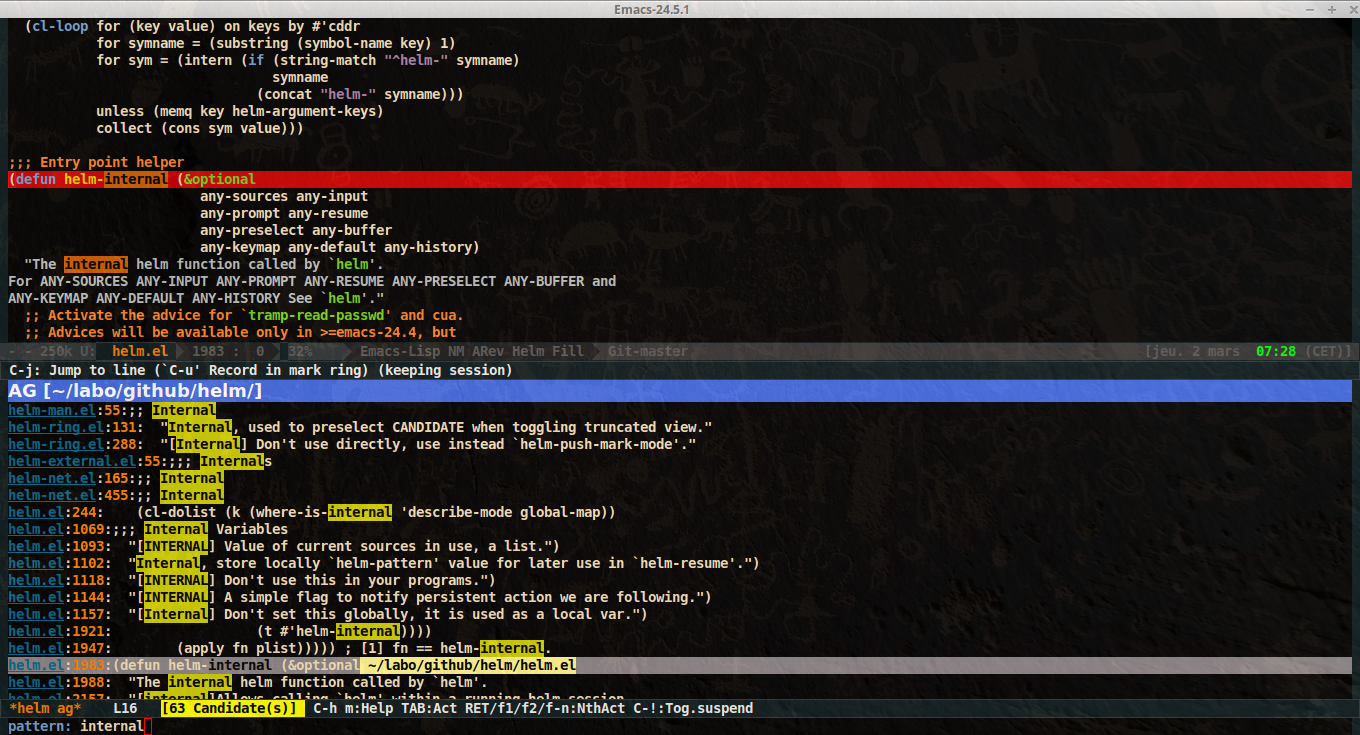
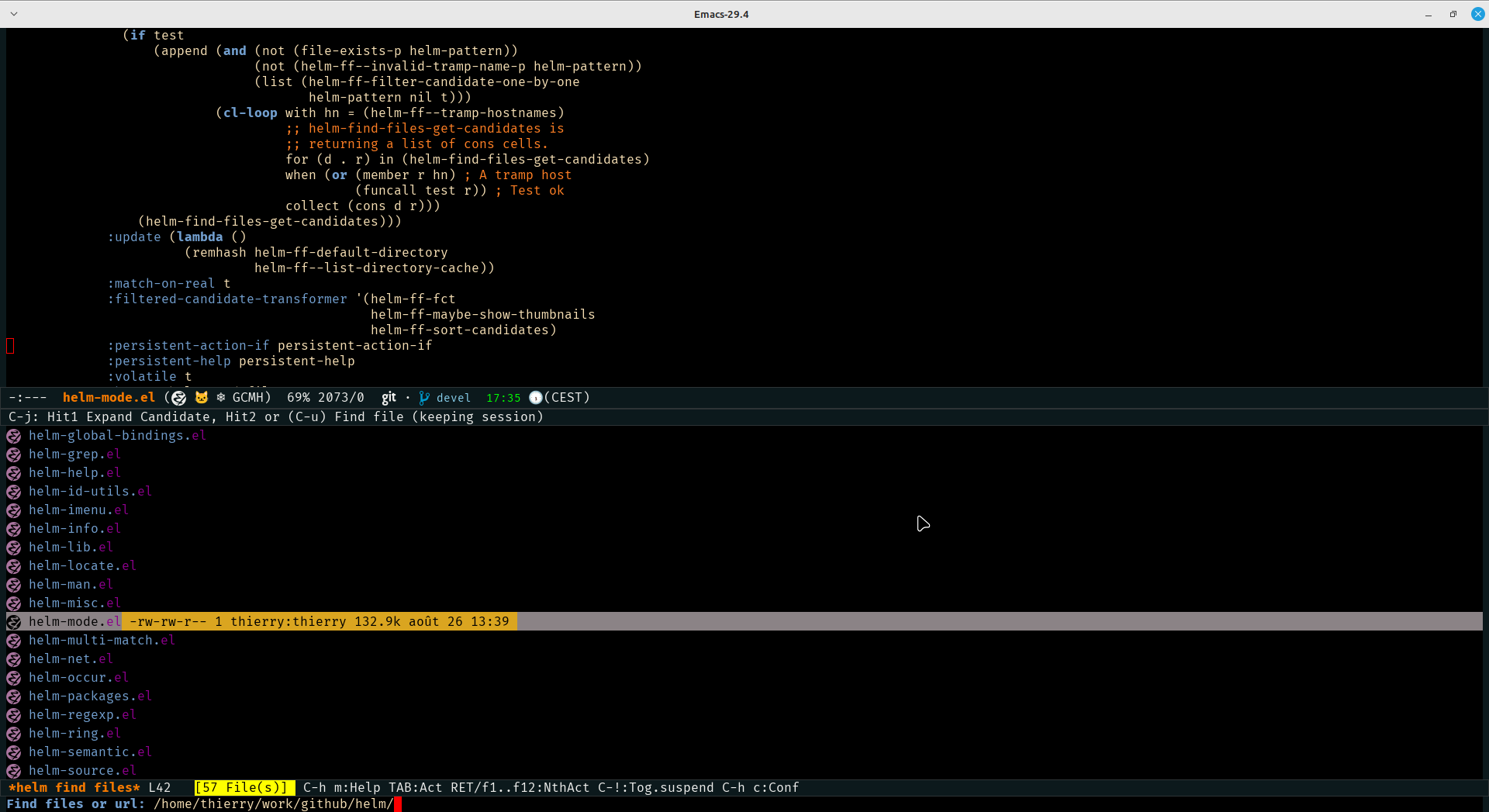
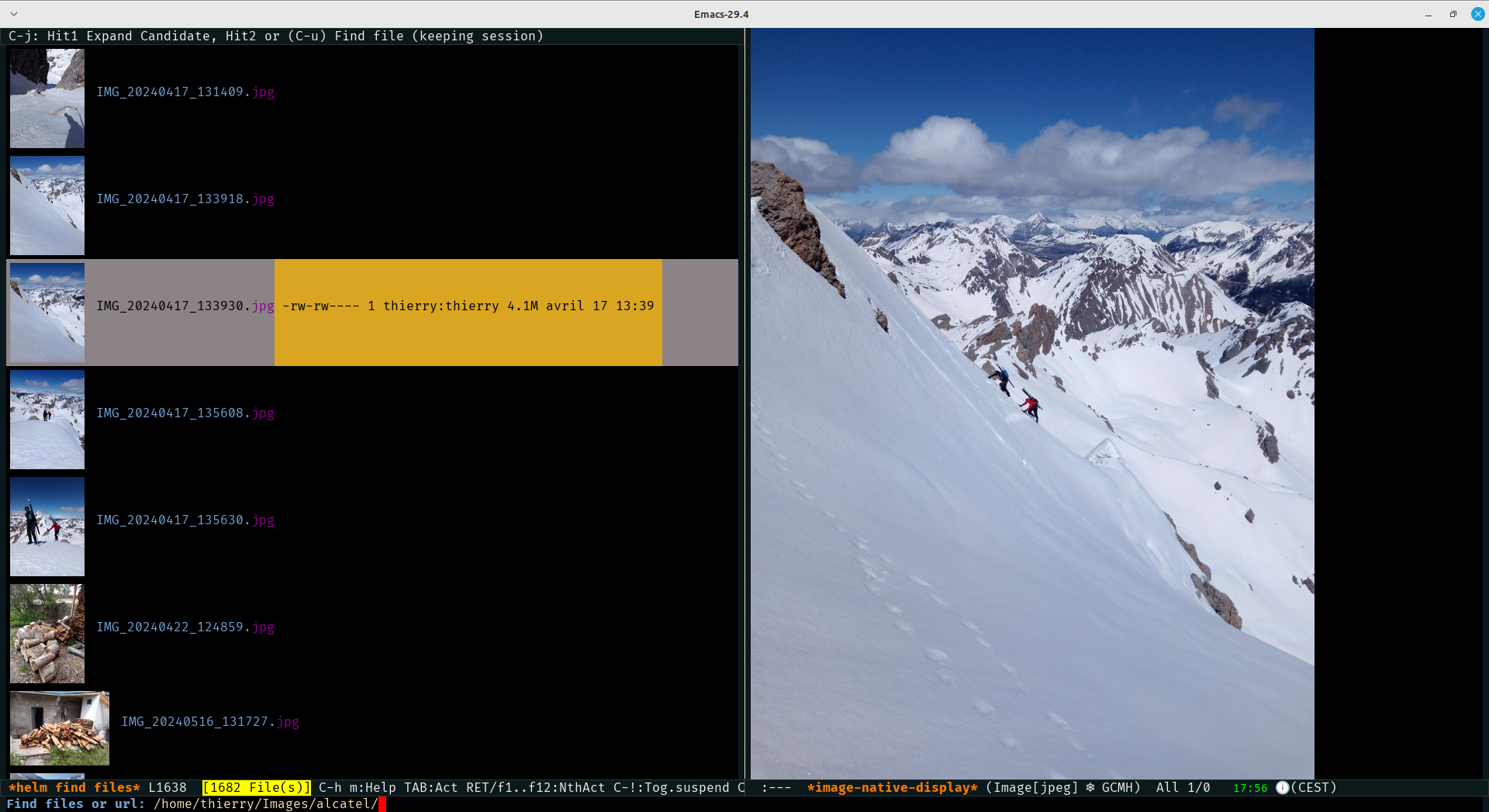
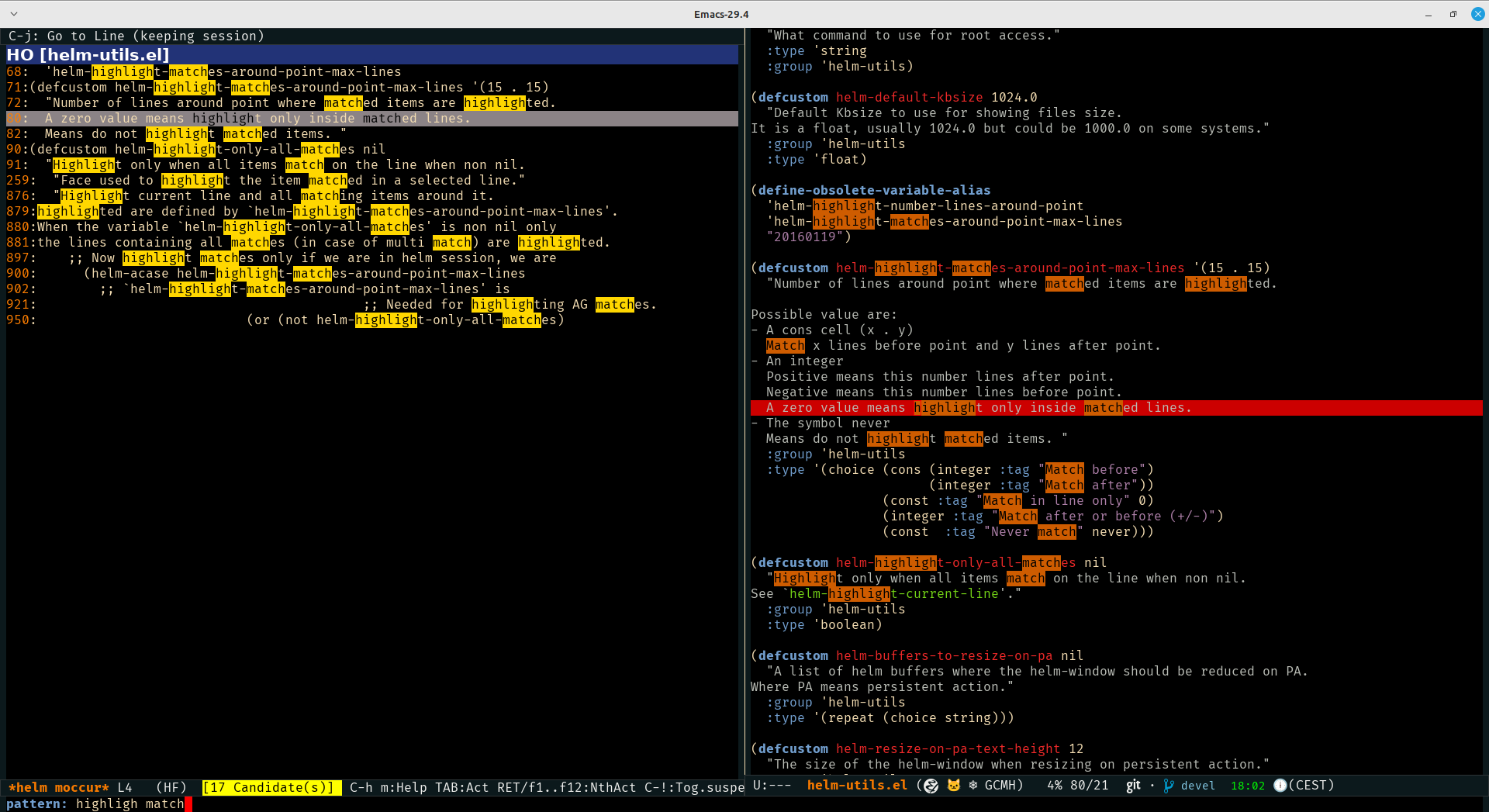
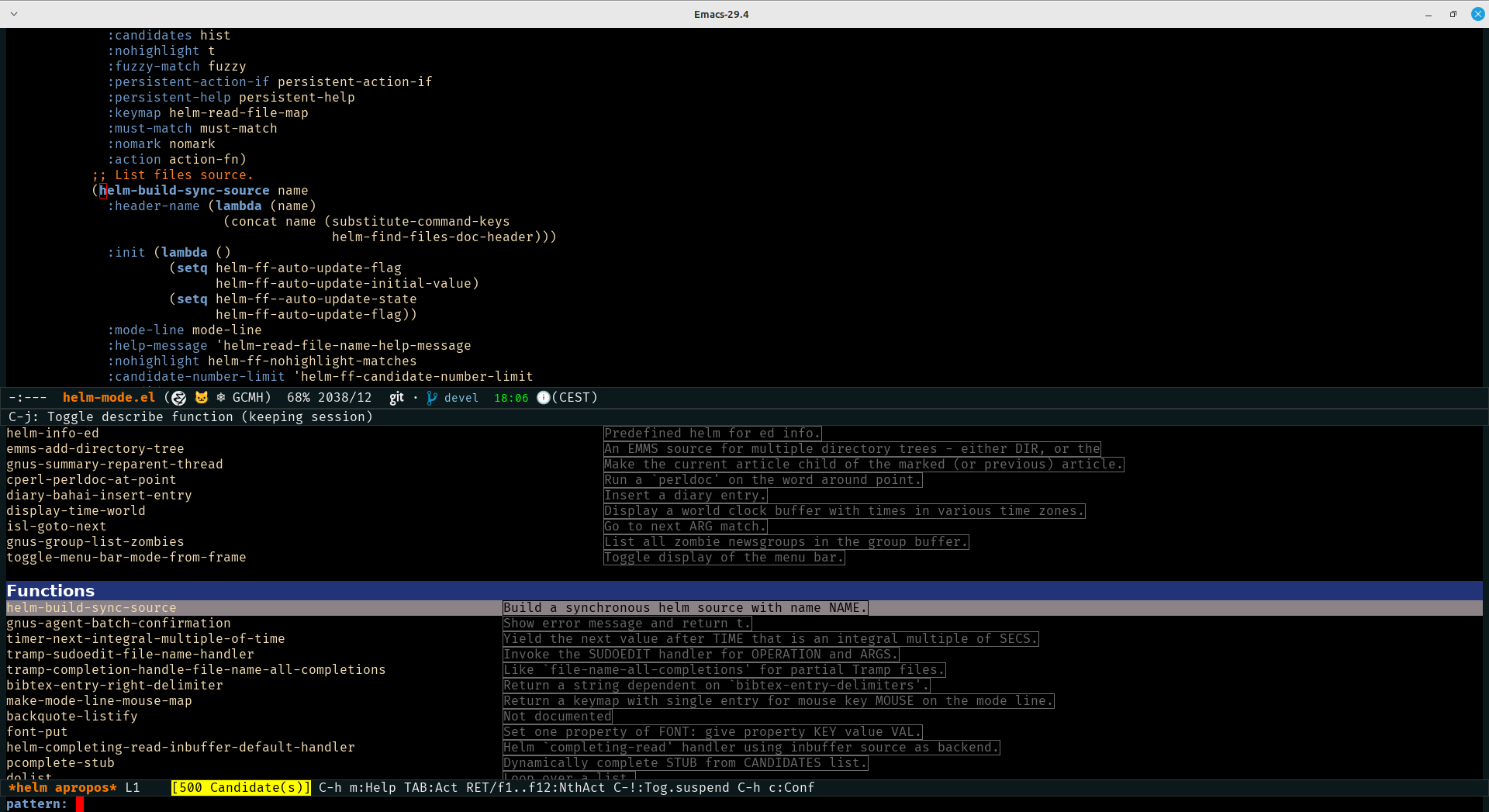
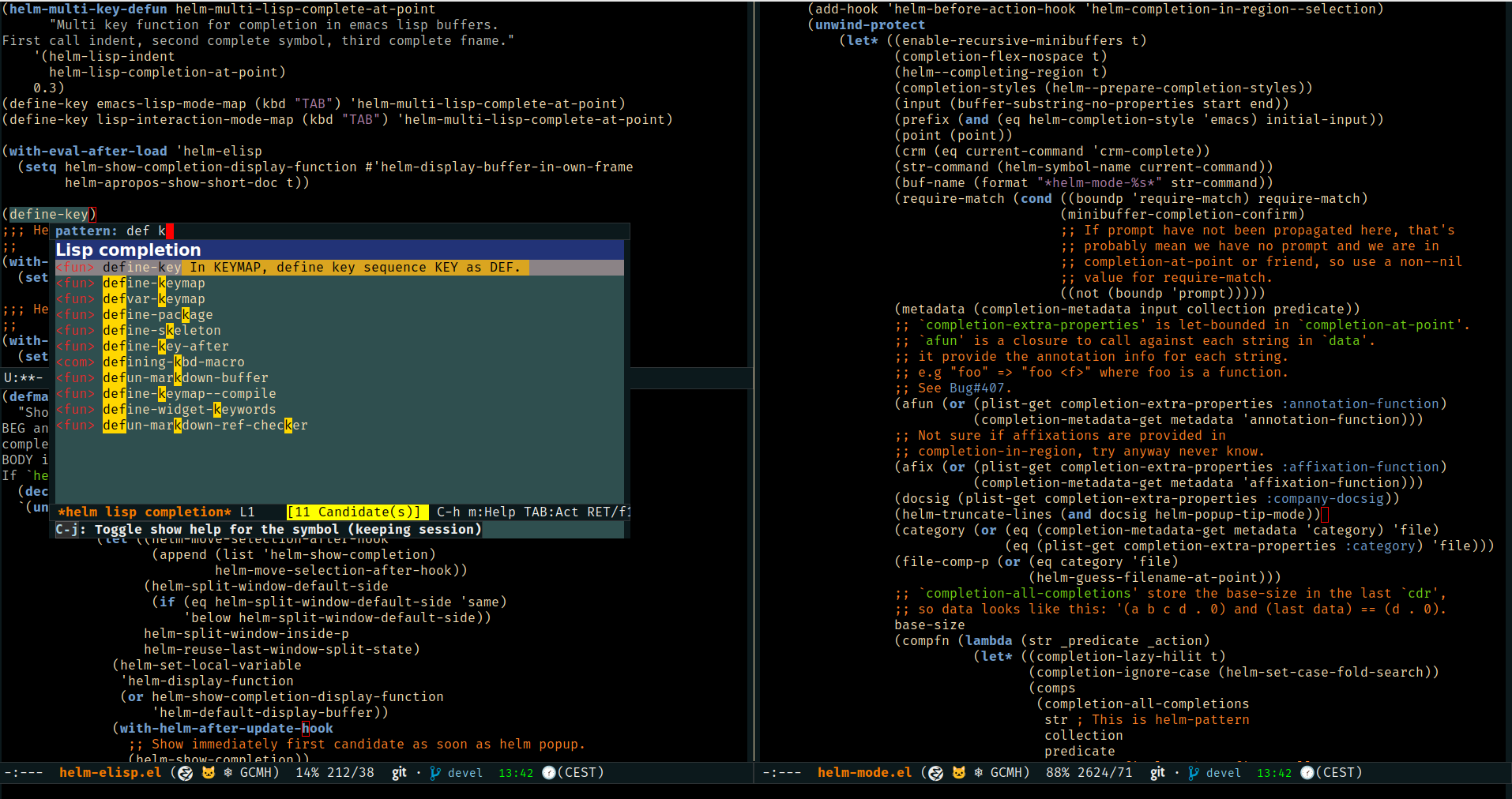
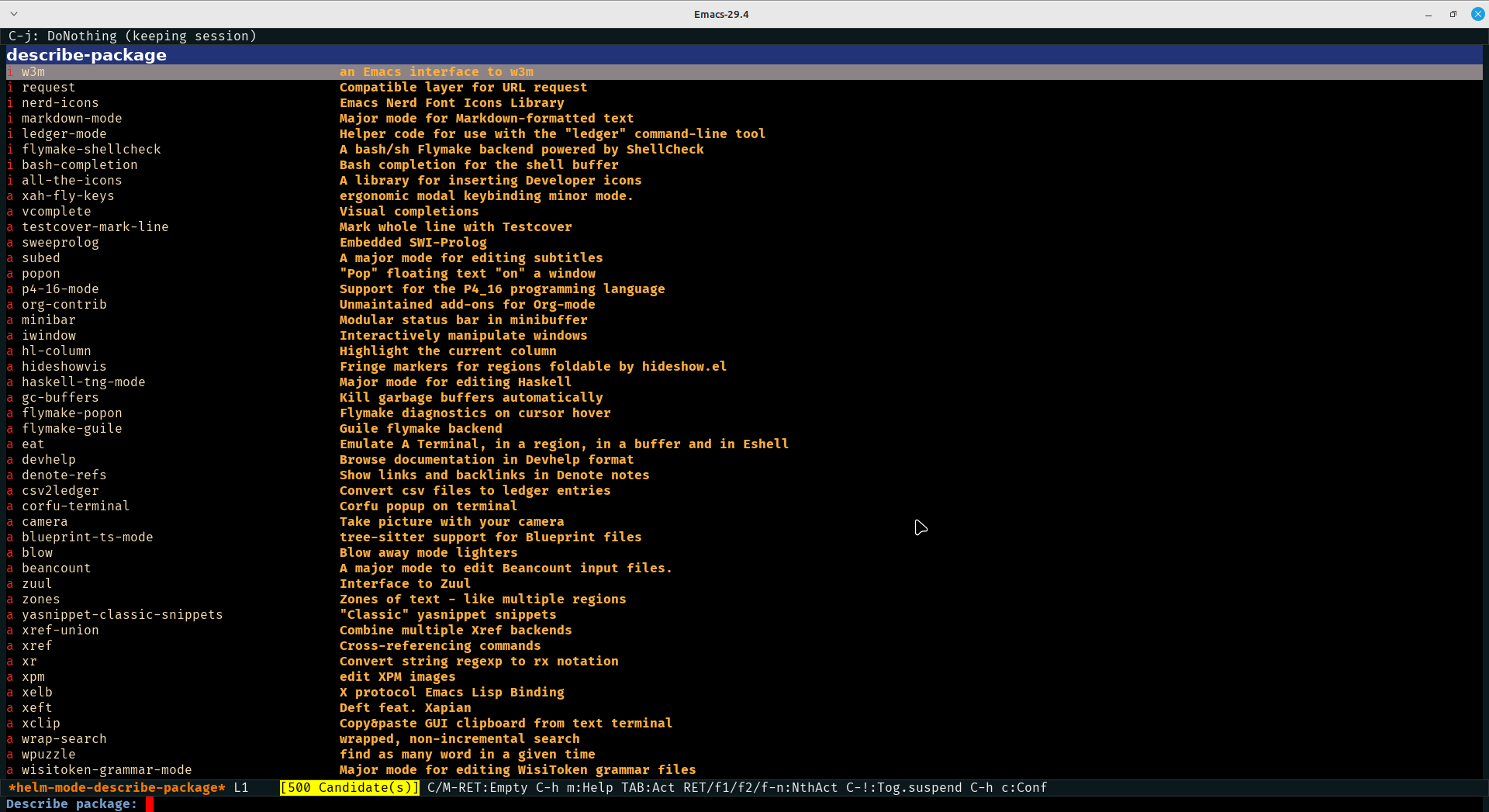
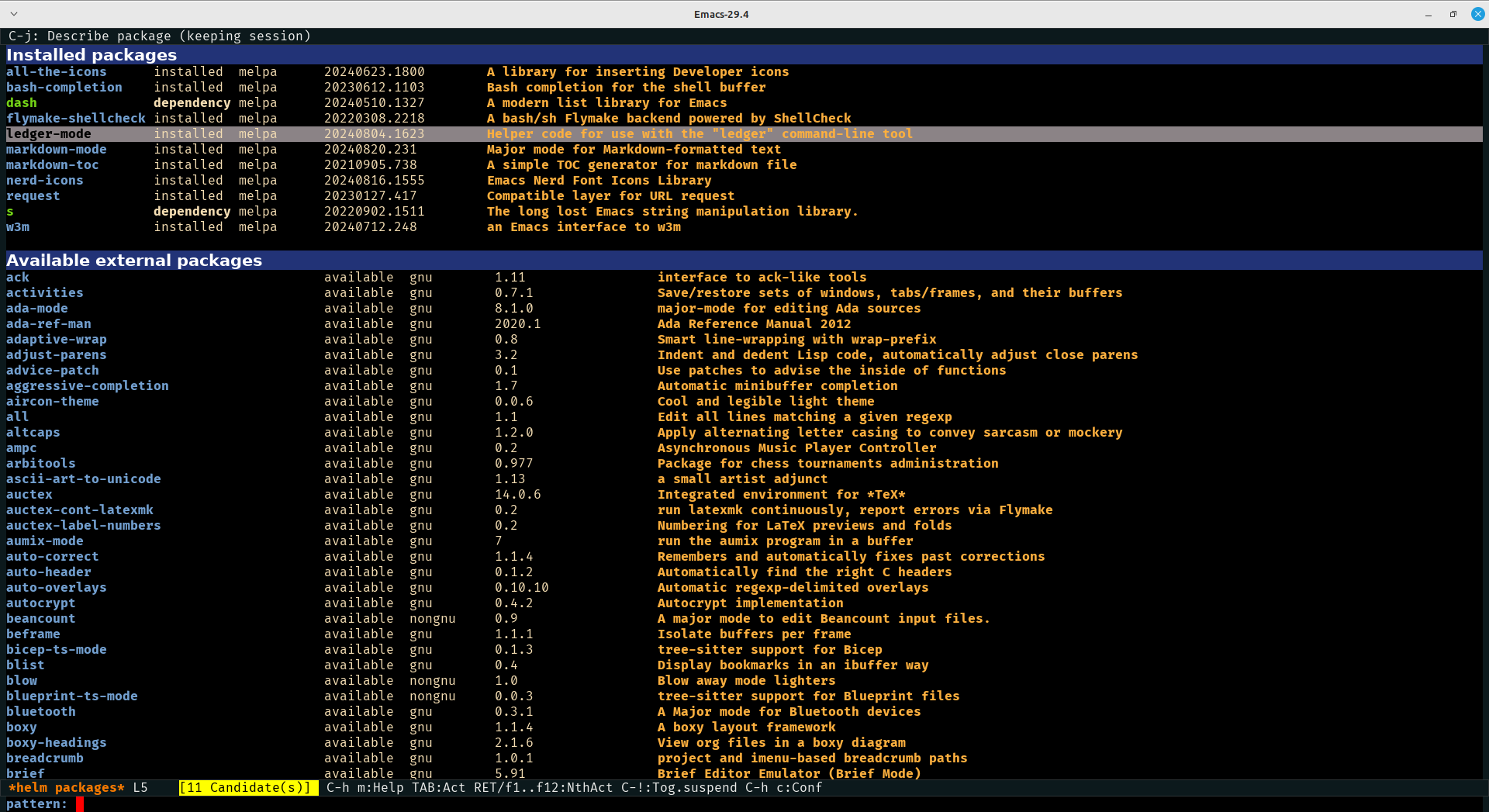
Features
In addition of its framework where you can build your own Helm
applications, Helm provides preconfigured commands to browse and
search incrementally in files, buffers, bookmarks etc… and much
more. Helm allows displaying different sources in same session. Helm
displays its candidates in a window or a frame, keeping the minibuffer for
user input. Helm provides a full set of actions for each of its
sources, each action apply on a single candidate or a set of marked
candidates.
Note: You will find many helm extensions providing diverse features sometimes already implemented in Helm,
prefer generally the ones that are natively in Helm, e.g. Helm support natively most grep implementations as backend (ack, ag, rg),
no need to install 3rd party packages for this, same for managing projects etc…
Requirements
Helm requires Emacs-25.1 or later versions.
Helm installs async and wfnames package as dependencies when Helm is installed using MELPA.
It is recommended to install all-the-icons or nerd-icons to have icons in several places (files, buffers etc..) even if it is not mandatory.
Getting Started
Install from Emacs packaging system
Quick install from git
Install from Straight
See Install from straight package manager
Installing just the helm-core package
helm-core package is available on MELPA for
third party packages that depend on helm libraries. These packages
should require helm as follows:
(require 'helm)
Requiring helm builds and runs helm code necessary for multiple regexp and fuzzy matching. See helm wiki for details.
Configuration
Helm is fully configurable with dozen of user variables and for more advanced users,
even some helm sources are configurable throught cl-defmethod and helm-setup-user-source.
Minimal helm configuration:
(require 'helm)
(helm-mode 1) ; facultative.
Extended configuration
The full configuration I (the helm maintainer) use is here.
Also see helm customizable variables with the customize interface.
You have access to the specific custom-variables for a source with C-h c while running Helm.
Enabling helm-mode will enable helm for many features of emacs
requiring completions, see below how to enable helm-mode.
General recommandations
-
When you have problems like Helm beeing slow or something not working, always fallback to default settings.
-
Configure Helm yourself, don’t use preconfigured Emacs that configure wrongly Helm for you (e.g. Spacemacs).
-
Refrain installing all Helm packages you find in Melpa, check first if the feature you are looking for is available in Helm.
-
Nowaday, there is dozen of completion UI available for Emacs, refrain using many of those in addition with Helm unless you know what you are doing.
Basic usage
Helm use by default a prefix key (C-x c) which is not very convenient but allow users to discover
most important helm commands, once you find them you can rebind to a convenient key of your choice,
here some of them:
C-x c M-x helm- lists helm commands ready for narrowing and selecting with helm-M-x.
To bind to M-x:
(global-set-key (kbd "M-x") 'helm-M-x)
C-x c C-x C-f browses files on your system.
To bind it to C-c C-f
(global-set-key (kbd "C-c C-f") 'helm-find-files)
To discover such commands more easily, you can install helm-descbinds.
Once installed and helm-descbinds-mode enabled, you can do C-x c C-h to see all commands starting with helm prefix key.
- IMPORTANT:
In any helm session,
C-h m pops an org buffer with detailed documentation about current command and more generalized infos about helm.
Use it with no moderation!
Use these embedded Info screens first before reporting bugs.
M-x helm-mode to enable helm completion for common Emacs
commands. Note that the helm functionality enabled through helm-mode
comes from a generic implementation and does not include all helm
features available through equivalent helm-specific commands.
See FAQ
about M-x and C-x C-f.
To make helm-mode starts with Emacs init file:
(helm-mode 1)
To make helm-mode nicer you can set the variable completions-detailed to non nil (emacs-28+),
with emacs-27 use helm-completions-detailed.
helm-mode is fully configurable throught the variables
helm-completing-read-handlers-alist, helm-completion-style,
helm-completion-styles-alist.
NOTE: helm-mode support Emacs completion-styles for matching candidates
when helm-completion-style is set to emacs, it is not the default because
it is slower than the helm style used by default.
You can also discover basic helm commands with helm menu items in Emacs menu.
Another way to discover helm commands: run the shell script:
./emacs-helm.sh from helm directory and then look in the scratch
buffer. emacs-helm.sh accepts emacs command line
options. emacs-helm.sh -h opens an Info screen with more details.
Note: When helm is installed with “make install” you will have a shell command named helm that you can run from any places i.e. not only from the helm directory, you can do this yourself if you have installed from package by making a symlink of emacs-helm.sh in your load-path e.g. “~/bin”.
See https://github.com/emacs-helm/helm/wiki#quick-try-with-emacs-helmsh
Windows and frames configuration
Helm allows displaying its candidates in several ways, side windows, frames, one window etc…
You will find the documentation with C-h m as usual or on wiki, use as well C-h c to see the relevant variables you can set.
Here helm started from emacs-helm.sh script and displaying its candidates in a separate frame:
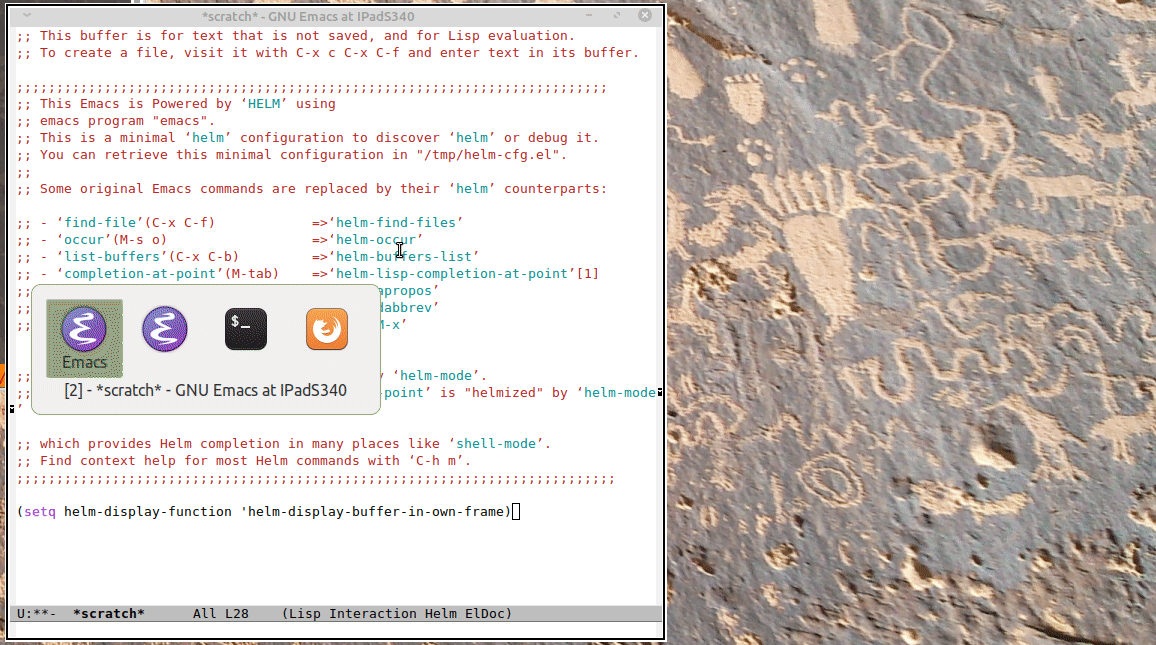
To use frames to display helm candidates see the variable helm-display-function. Even better, use the variable helm-commands-using-frame, e.g.
(add-to-list 'helm-commands-using-frame 'helm-M-x)
According to the position in the current buffer you started Helm from, the minibuffer will be displayed on top or bottom of the frame.
NOTE: A Helm package called helm-posframe exists which use itself the posframe package,
please DO NOT use this to display helm completions in frame, it uses child frames internally
which is the wrong approach for Helm.
Matching methods
Helm supports by default multi pattern matching, it is the standard way of matching in helm. E.g You can use a pattern like “foo bar” to match a line containing “foo” and “bar” or “bar” and “foo”. Each pattern can be a regexp.
In addition helm support fuzzy matching.
Display icons with all-the-icons or nerd-icons package
Customize the variable helm-x-icons-provider to choose you icons provider.
Then you can have icons in many places, see the corresponding variables or modes where you can have them.
For example you can have icons in helm-find-files with M-x helm-ff-icon-mode
once you have properly installed and configured your icons provider package.
Have brief infos on the selected candidate
For this turn on helm-popup-tip-mode, you will have a popup at end of line showing
detailed infos on candidate (only available in some sources).
Creating custom helm sources
An example:
(helm :sources (helm-build-sync-source "test"
:candidates '(foo foa fob bar baz)
:fuzzy-match t)
:buffer "*helm test*")
The candidates list may be replaced by a function that produces a list. See (helm wiki) for details.
Helm Applications
Here are some popular applications developed using helm completion and
narrowing framework and available in Helm package.
This list is not exhaustive.
-
helm-mode: turns on helm completions for most standard emacs completions. Helm provides even more optimized helm completions for some commands in helm-mode. Prefer these natively optimized versions over the ones in helm-mode. -
helm-find-files: one command that handles all the files related commands (bind toC-x C-f). -
helm-buffers-list: provides enhanced buffers listing. -
helm-browse-project: handles project files and buffers; defaults to current directory; works withhelm-find-files; recommended with helm-ls-git, helm-ls-hg andhelm-ls-svnfor a better handling of version control files. Each time a project under version control is visited it is added tohelm-browse-project-historyand can be visted withhelm-projects-history. -
helm-dabbrev: enhanced dabbrev implementation with helm completion; does not use emacs code. -
helm-occur: enhanced occur for one or more buffers; launch fromhelm-buffers-listorcurrent-buffer. -
helm-M-x: enhancedexecute-extended-command(bind it toM-x). -
helm-imenuandhelm-imenu-in-all-buffers: provide imenus for current or all buffers. -
helm-etags-select: enhanced etags with helm-completion; usable everywhere withhelm-find-files. -
helm-apropos: enhanced apropos for functions and variables thatC-hcommands provide. -
Helm
Grep,Ack-grep,Ag,Rg: provided as actions in all helm commands for file; Support back-endsgrep,ack-grep,git-grep,ag,rgand probably others. You will find several grep actions in the action menu ofhelm-find-files. You can launch as well from your current buffer ondefault-directoryhelm-do-grep-ag,helm-grep-do-git-grep. NOTE: helm-*-ag functions and command use “ag” name for historical reason but support as well “rg”. -
helm-gid: Helm interface forgidfrom id-utils. -
helm-show-kill-ring: A helm browser for kill ring. -
helm-all-mark-rings: A helm browser for mark ring; retrieves last positions in buffers. -
helm-filtered-bookmarks: enhanced browser for bookmarks. -
helm-packages: enhanced browser for elisp package management.
Recommended Helm extensions
Normally all Helm modules coming from Emacs-helm organisation are safe to use otherwise it is mentioned in their README if they are broken or unmaintained. Here some of them I am using:
- helm-ls-git
- helm-addressbook
- helm-dictionary
- helm-mu
- helm-slime
- helm-descbinds
- helm-firefox
- helm-w3m
- helm-emms
- helm-apt
- helm-org
- helm-bm
- helm-wikipedia
Warning Helm development has sparked quite a few extensions, many
of which duplicate features already included in helm. Some of these
packages (about 20 at last count in the MELPA repository) are either
deprecated or unmaintained. Moreover, many remain out-of-sync with
helm core development cycles causing incompatibilities. To avoid
helm problems or unstable emacs, please look for comparable features
within helm and
emacs-helm before installing such
extensions e.g. helm-swoop which is badly written and unmaintained vs helm-occur which is part of Helm.
Other emacs extensions recommended with helm
svg-lib allows using a svg progress-bar for Rsync in helm-find-files, see the variable helm-rsync-progress-bar-function.
External programs recommended with helm
Known issues
The Helm project has a current unresolved issue list. Please feel free to fix any of them; send a pull request.
Most issues come from a wrong configuration or a use of Helm modified externally by third party package e.g. Spacemacs. Some other Helm packages that are no more maintained (or badly maintained) and use deprecated Helm code will clash also with recent Helm, be aware!
Contributors
The Helm project maintains a list of contributors.
Bugs & Improvements
The Helm Team welcomes bug reports and suggestions. Note that not all bugs when using Helm are due to Helm. Because of the way Helm interacts with many Emacs features, bugs may be related to Emacs itself.
One way to ascertain that the bugs are helm-related, recreate the
error either by using Emacs -Q or by running the included package
script ./emacs-helm.sh located in the helm directory. You can now
also run M-x helm-packages and from the installed packages source run
the “Isolate packages” action after having selected helm, this of
course if you have installed Helm from package.
If you want a specific feature not already implemented in Helm, fill a feature request report, I will be happy to implement this for you if possible.
Helm comes now with a template for filling bugs, when reporting issues, be sure to fill all sections and to run helm from a minimal install as described above to reproduce your bug.
NOTE: Please don’t cheat when checking “I use a minimal configuration”, you will make me loosing my time and your time to try to find what is wrong.
Getting help
Or ask directly on Helm discussions, I will be happy to answer your questions or help you to configure Helm or more generally Emacs.
Do not expect the right answer when you ask on Reddit or similar Forums.
Cheers,
The Helm Team

